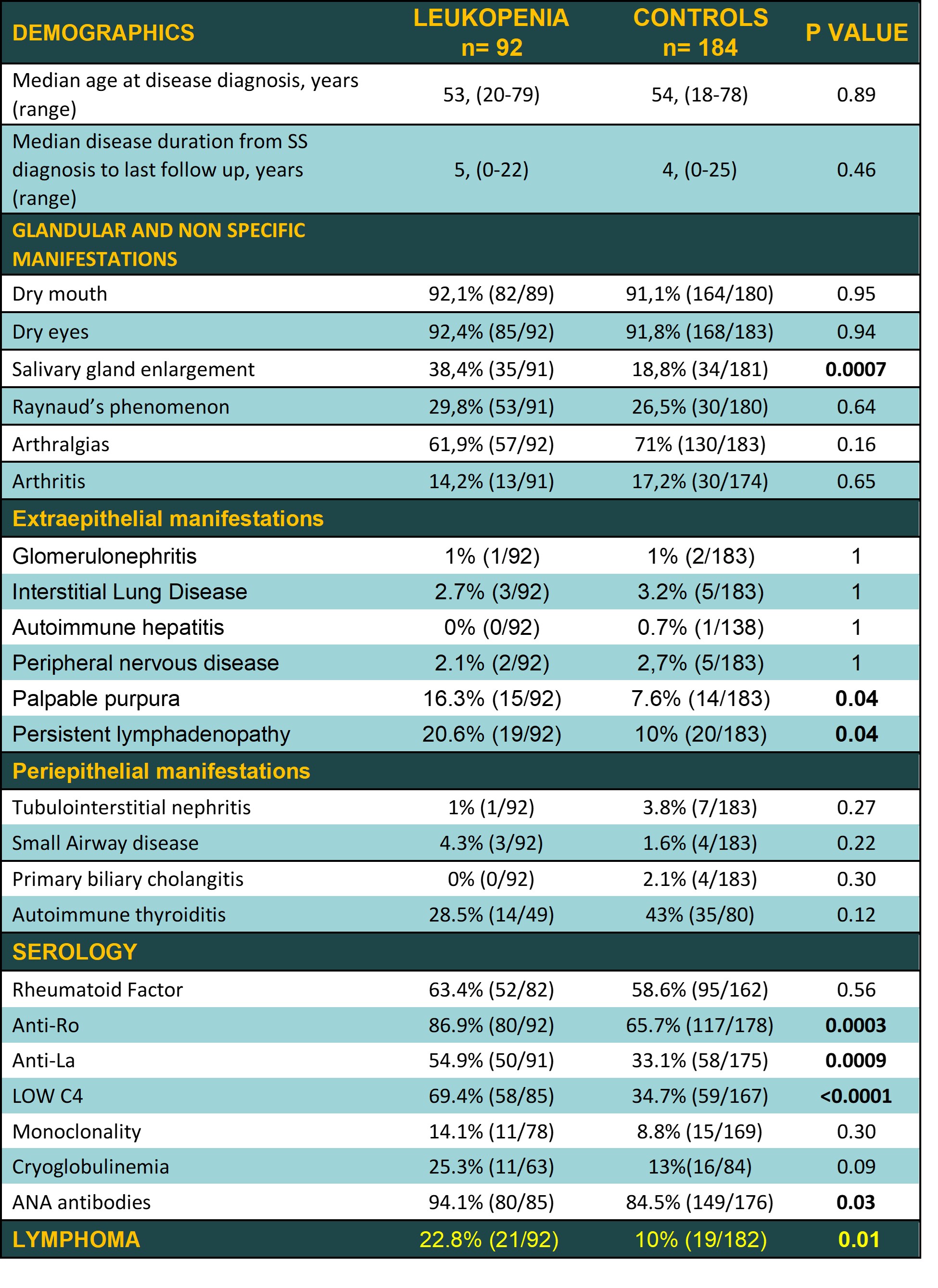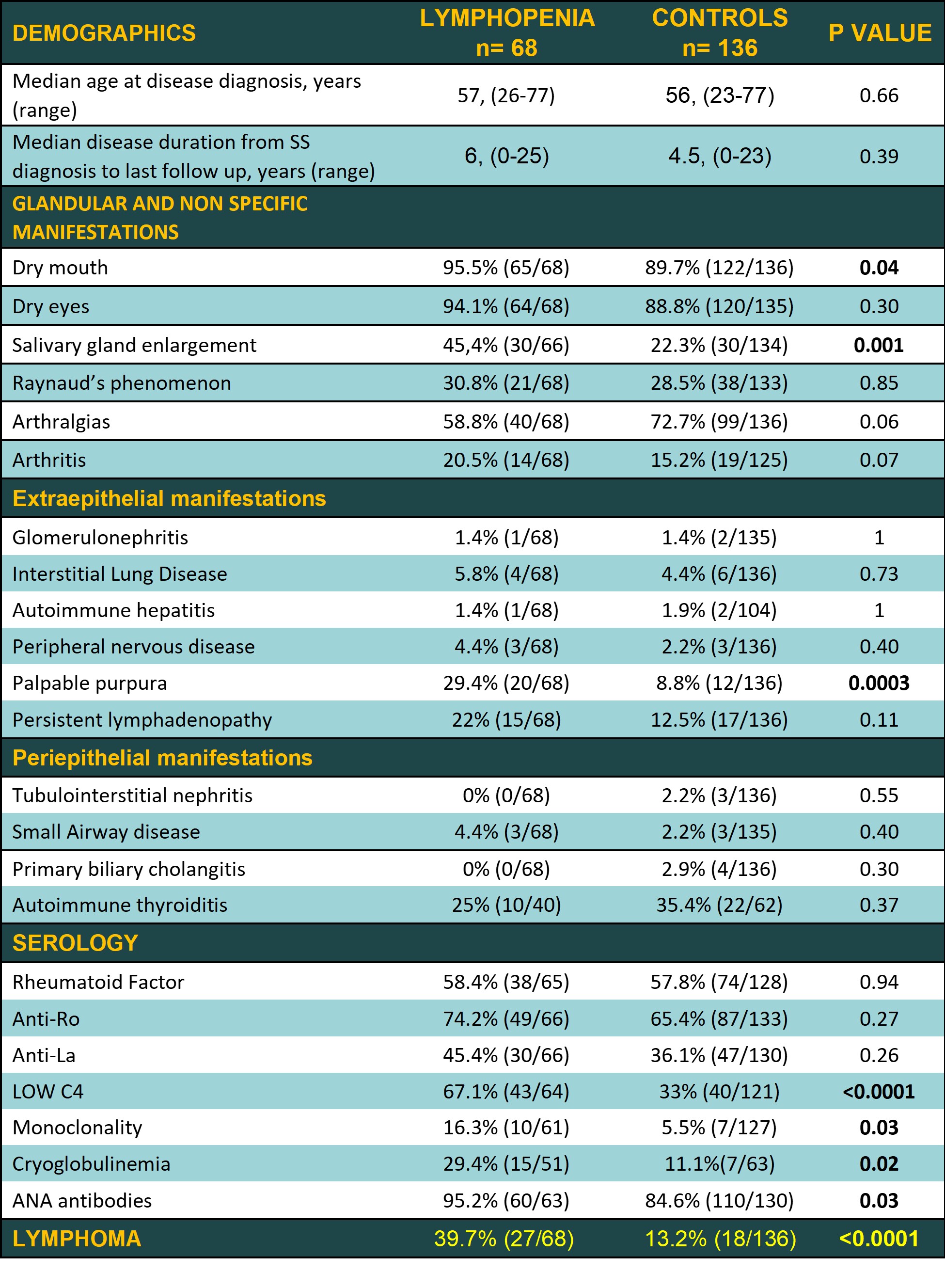Session Information
Date: Saturday, November 6, 2021
Title: Sjögren's Syndrome – Basic & Clinical Science Poster (0296–0322)
Session Type: Poster Session A
Session Time: 8:30AM-10:30AM
Background/Purpose: Peripheral lymphopenia and leukopenia in Sjögren’s syndrome (SS) may suggest systemic disease activity and have been proposed as lymphoma predictors. However, the clinical phenotype of these subsets of SS patients is poorly defined. The objective of the present study is to investigate whether leukopenia and lymphopenia at SS diagnosis interferes with clinical manifestations, serology, disease course and lymphoma development.
Methods: From a total population of 1017 consecutive patients fulfilling the 2016 ACR-EULAR criteria for SS, who were followed-up in 3 centers from Greece (Universities of Athens, Harokopio and Ioannina), those with persistent lymphopenia or leukopenia were identified and matched with non-lymphopenic and non-leukopenic SS controls respectively, according to age at SS diagnosis, gender and disease duration from SS diagnosis to last follow up in a 1:2 ratio. Persistent lymphopenia and leukopenia were defined as an absolute lymphocyte and white blood cell count < 1000/mm3 and 4000/mm3, respectively, detected in at least 3 consecutive visits within 1 year after SS diagnosis. Cumulative data regarding glandular (dry mouth, dry eyes, parotid gland enlargement) and extra-glandular manifestations (Raynaud’s phenomenon, lymphadenopathy, arthralgias/arthritis, palpable purpura, liver involvement, kidney involvement, lymphoma), serology (anti Ro/SSA, anti La/SSB, rheumatoid factor, cryoglobulinemia, low C4 complement levels) and histologic features (focus score, presence) were recorded and compared between each study group and their matched SS controls. Statistical analysis for categorical data was performed by Fisher exact test or χ2 square test accordingly and numerical data with Man Whitney test.
Results: Ninety-two SS patients with leukopenia and 68 with lymphopenia were identified and compared with 184 and 136 non-lymphopenic and non-leukopenic SS controls, respectively. Twenty-four SS patients had both leukopenia and lymphopenia and participated in both study groups. The median disease duration of leukopenic and lymphopenic SS patients was 5 (range: 0 -22) and 6 years (range: 0-25) respectively whereas the median age of SS diagnosis was 53 (range: 20-79) and 57 (range:26-77) years old respectively. SS patients with leukopenia had statistically significant higher frequency of salivary gland enlargement (38,4% vs 18,8%, p=0,0007), palpable purpura (16,3% vs 7,6%, p=0,04), persistent lymphadenopathy (20,6% vs 10%, p=0,04), ANA antibodies (94,1% vs 79,9%, p=0.03), anti SSA/Ro antibodies (86,9% vs 65,7%, p=0,0003), anti SSB/La antibodies (54,9% vs 33,1%, p=0,0007), low C4 serum levels (69,4% vs 34,7%, p=0,007) and lymphoma (22,8% vs 10,4%, p= 0.01) (Table 1). SS patients with lymphopenia had more frequently salivary gland enlargement (45,4% vs 22,3%, p=0.001), palpable purpura (29,4% vs 8,8%, p=0.0003), ANA antibodies (95,2% vs 79,9%, p=0.003)), low C4 serum levels (67,1% vs 33%, p< 0.0001), cryoglobulinemia (29,4% vs 11,1%, p=0.02) and lymphoma (39.7% vs 13.2%, p= < 0.001) (Table 2).
Conclusion: SS patients with leukopenia and lymphopenia constitute specific disease subgroups with distinct clinical phenotypes associated with increased lymphoma prevalence.
To cite this abstract in AMA style:
Chatzis L, Stergiou I, Pezoulas V, Voulgari P, Fotiadis D, Skopouli F, Moutsopoulos H, Voulgarelis M, Tzioufas A, Goules A. Lymphopenia and Leukopenia in Sjogren Syndrome [abstract]. Arthritis Rheumatol. 2021; 73 (suppl 9). https://acrabstracts.org/abstract/lymphopenia-and-leukopenia-in-sjogren-syndrome/. Accessed .« Back to ACR Convergence 2021
ACR Meeting Abstracts - https://acrabstracts.org/abstract/lymphopenia-and-leukopenia-in-sjogren-syndrome/


